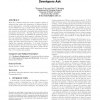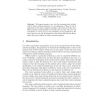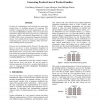54 search results - page 3 / 11 » Program Fragments, Linking, and Modularization |
108
click to vote
ICSE
2010
IEEE-ACM
15 years 7 months ago
2010
IEEE-ACM
Each day, a software developer needs to answer a variety of questions that require the integration of different kinds of project information. Currently, answering these questions...
105
click to vote
AMAST
2004
Springer
15 years 6 months ago
2004
Springer
This paper presents a new rule for reasoning about method calls in object-oriented programs. It is an adaptation of Hoare's rule of adaptation to the object-oriented paradigm,...
226
Voted
POPL
2005
ACM
16 years 2 months ago
2005
ACM
We define compositional compilation as the ability to typecheck source code fragments in isolation, generate corresponding binaries, and link together fragments whose mutual assum...
114
Voted
ICFP
2006
ACM
16 years 2 months ago
2006
ACM
Despite its powerful module system, ML has not yet evolved for the modern world of dynamic and open modular programming, to which more primitive languages have adapted better so f...
143
click to vote
KBSE
2002
IEEE
15 years 7 months ago
2002
IEEE
GenVoca is a methodology and technology for generating product-lines, i.e. building variants of a program. The primitive components from which applications are constructed are ref...



